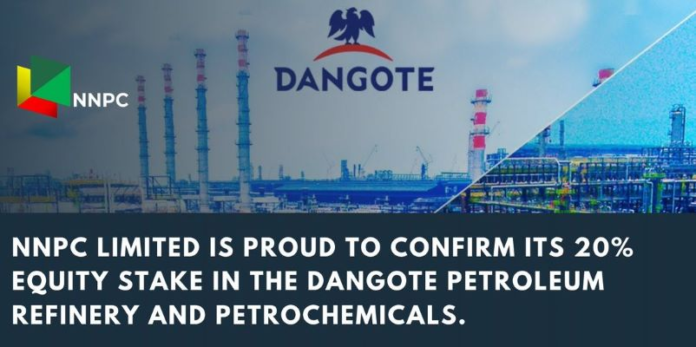Although a recent data obtained from the Nigerian National Petroleum Corporation (NNPC) Limited’s audited financial report for 2022 indicates that the national oil company borrowed $1.3 billion to acquire a 20% stake in Dangote Refinery, Chief Executive Officer (CEO) of the Refinery, Aliko Dangote, has revealed that NNPC Ltd now owns only 7.2%.
Speaking during a press conference at the refinery on Sunday, Dangote said NNPC’s failure to pay the balance of its share, which was due last month in June reduced its stake to only 7.2% of the refinery.
He further stated that NNPC had promised to provide the funds but that it has been unable to meet its obligations, thus reducing its stake in the $19 billion refinery to 7.2%.
“NNPC no longer owns 20% stake in the Dangote refinery. They were met to pay their balance in June, but have yet to fulfill the obligations. Now, they only own a 7.2% stake in the refinery,” Dangote said.

Confirming the development in a statement, the NNPC Ltd through its Chief Corporate Communications Officer, Olufemi Soneye, said its period assessment of the investment portfolio led to the decline in its share of the refinery.
“NNPC Limited periodically assesses its investment portfolio to ensure alignment with the company’s strategic goals.
“The decision to cap its equity participation at the paid-up sum was made and communicated to Dangote Refinery several months ago.”

In March 2021, Nairametrics reported that NNPC was planning to raise the sum of $2.76 billion in credit facility to purchase 20% stake in Dangote refinery.
The NNPC Chief Operating Officer, Refining and Petrochemicals, Mr Mustapha Yakubu, said this plan is to secure Nigeria’s place in the massive project, making it resource-dependent.
He said this was part of the then government’s plan to work with private oil companies to safeguard the country’s energy security without undermining the plans to rehabilitate its own refineries.
With the recent data sourced from NNPC Ltd’s newly released audited financial report for 2022 showing that the national oil company borrowed $1.3 billion to acquire the stake, and Dangote, saying the company has only paid enough to acquire 7.2% of the refinery was the money actually used as intended?
In 2021 the Federal Executive Council gave an approval for NNPC to acquire 20 percent stake in the refinery.
An insider in the NNPC said acquisition translates to 130,000 barrels per day added: “Firstly, the proposal to take a 20 percent stake in the Dangote Refinery is in line with a government directive stipulating the mandatory participation of the corporation in any privately owned refinery that exceeds 50,000 barrels per day capacity.
“Secondly, the corporate objective of the corporation is designed to grow the domestic refining capacity and improve petroleum products supply from local refineries.
“Thirdly, here is a sound justification in investing in a private sector driven project: A resource-dependent country as Nigeria cannot but show interest, and have a stake, in a business that borders on energy security and has fiscal security implications for the economy.”
Currently, the circumstances surrounding that $1.3 billion investment is begging for answers.
The Dangote Refinery is a massive oil project located in the Lekki Free Zone, Lagos, Nigeria, boasting a capacity of 650,000 barrels per day (BPD). Owned by the Dangote Group, it aims to become Africa’s largest oil refinery and the world’s biggest single-train facility.
The refinery is expected to generate 9,500 direct jobs and an additional 25,000 indirect jobs, providing a substantial economic boost to the region.
Once fully operational, the refinery will produce approximately 50 million litres of petrol and 15 million litres of diesel daily, equating to 10.4 million tonnes of petroleum products annually.
It will also yield 4.6 million tonnes of diesel and 4 million tonnes of jet fuel per year. Moreover, the facility includes a fertiliser plant that will utilize by-products from the refinery as raw materials, further enhancing its economic and environmental impact.
Additional reports from Nairametrics





